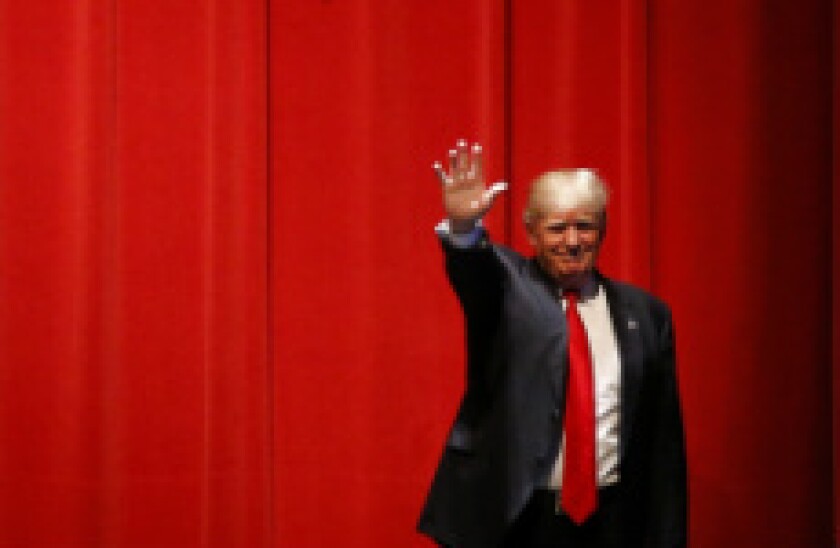The Chinese government gave fresh approvals to some state-owned and private companies to buy around 2m to 3m tonnes of US soybeans without being subject to retaliatory tariffs, Bloomberg reported on Tuesday, citing people familiar with the situation. Among the companies are state-owned buyers Cofco Group and China Grain Reserves Corp.
In separate news, Steven Mnuchin, US treasury secretary, told reporters on Monday that he and Robert Lighthizer, US trade representative, will meet Chinese vice premier Liu He for trade talks in two weeks.
The announcement came even as the rhetorical war between the two countries raged on. On Tuesday, US president Donald Trump used some of the harshest criticisms yet against China’s trade practices at the United Nations General Assembly.
“Not only has China declined to adopt promised reforms, it has embraced an economic model dependent on massive market barriers, heavy state subsidies, currency manipulation, product dumping, forced technology transfers, and the theft of intellectual property and also trade secrets on a grand scale,” the president said.
He added that while he hoped to reach an agreement that is beneficial to both countries, he will not accept “a bad deal for the American people”.
On the same day in New York, Wang Yi, Chinese foreign minister, said the so-called decoupling of the US and China will generate disastrous results and “endless troubles”.
“Decoupling from China’s economy would be to decouple from opportunities, and the future,” Wang said at an event hosted by the US-China Business Council and the National Committee on US-China Relations.
*
China’s MoF has given state-owned enterprises a deadline by which to transfer part of their equity to a state-run pension fund, according to a joint release with four other ministries. The transfer must be completed by 2020.
Within days of the announcement, the MoF transferred 10% of its own shares held in Industrial and Commercial Bank of China and Agricultural Bank of China, two of the largest state-owned banks, to the National Council of Social Security Fund, according to shareholder announcements from ICBC and ABC on Thursday. The fund was set up to offer basic pension and insurance to individuals.
The equities transferred to the fund from ICBC and ABC accounted for 3.46% and 3.92% of the banks’ total shares, respectively. The shares transferred are valued at around Rmb115bn ($16bn).
*
The Hangzhou city government has come up with a way to strengthen the connection between the government and the city’s private companies.
It will send 100 party cadres to 100 selected Hangzhou-based companies as their “government affairs representatives” for a year. Alibaba Group Holding, the e-commerce giant, and Geely Automobile, an automaker, are among the selected companies.
These government reps’ main jobs are to assist the businesses in dealing with government affairs, including communicating with government departments, helping companies with their local investments, and most importantly, interpreting policies, according to the Qianjiang Evening, a state-owned newspaper.
*
The People’s Bank of China, the MoF and the National Development and Reform Commission (NDRC) held a joint press conference on Tuesday detailing the progress China has made in the past 70 years.
Yi Gang, the governor of PBoC, reinforced that the central bank has ample room for monetary easing. That said, he also reiterated that the bank has no intention to “flood the economy” and that its monetary policy stance will remain prudent.
Liu Kun, Chinese minister of finance, said that the private sector has been the major beneficiary of tax cuts.
“The government is clearly concerned about the economy, otherwise they wouldn’t have held such an inter-department press conference,” Yu Song, chief China economist at Beijing Gao Hua Securities, wrote in a Tuesday note. “There has also been some modest policy easing on the ground as NDRC and MoF urged local governments to submit their infrastructure project plans. However, the tone of policymakers from today’s press conference remains neutral.”
Economists at Nomura said that they disagreed with the regulators on certain points.
“We think Beijing’s space for policy easing has already become quite limited, and policymakers should not be too complacent about the amount of space currently in place to ease policy,” Ting Lu, chief China economist at Nomura, wrote in a Wednesday note.
“Conventional easing measures may not be able to solve many of the problems resulting from the non-market-based policy measures and interventions imposed on the economy over the past several years,” Lu added. “We believe that unshackling the economy via market-oriented reforms is the key to releasing growth potential. However, it will likely take time and things will likely need to worsen before Beijing strengthens its resolve to unshackle the economy.”
*
The China Banking and Insurance Regulatory Commission is soliciting public opinions on new measures governing the wealth management subsidiaries of domestic commercial banks. The rules set the net capital threshold for these subsidiaries at Rmb500m and require their net capital to be no less than 40% of their net assets.

